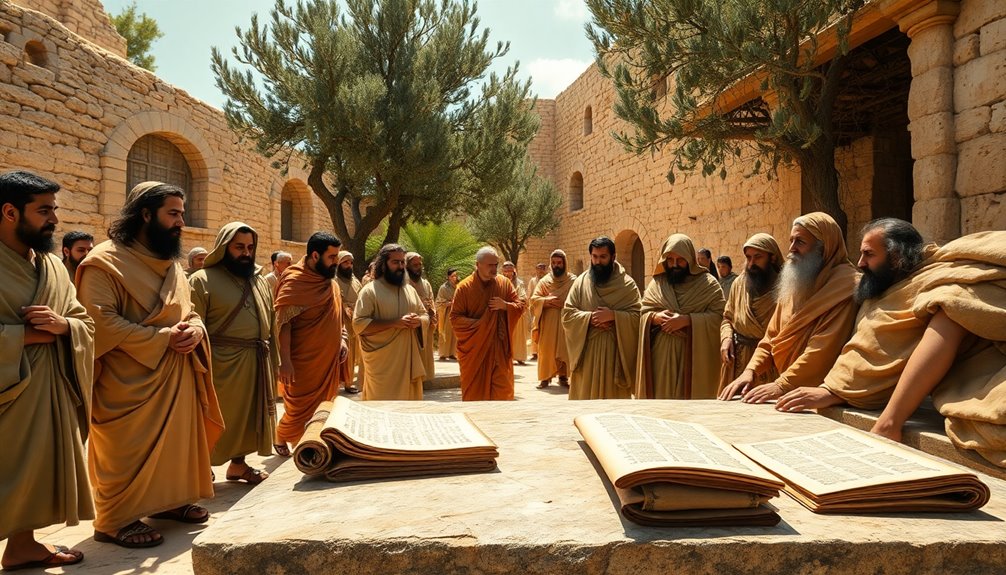The Pharisees were a significant Jewish group that formed around 165-160 BCE during the Second Temple period. They focused on both the Written and Oral Law, shaping Jewish practices and communal identity. You'd find them advocating for synagogue worship, especially after the Temple's destruction in 70 CE, making religious life more accessible. Often mentioned in the New Testament, they were viewed as both critics and supporters of Jesus. Contrary to stereotypes of legalism, they emphasized ethical behavior and personal piety. Their influence on modern Judaism is profound, and there's much more about their role and beliefs waiting for you.
Key Takeaways
- The Pharisees were a significant Jewish faction that emerged during the Second Temple period, around 165-160 BCE.
- They emphasized the importance of both Written and Oral Law, advocating for ethical behavior and individual interpretation of the Law.
- The Pharisees played a crucial role in shaping synagogue practices after the destruction of the Second Temple in 70 CE.
- Often depicted as opponents of Jesus in the New Testament, they were criticized for hypocrisy yet valued personal piety and moral conduct.
- Representing a predominantly middle-class demographic, the Pharisees promoted inclusivity in Jewish practices, challenging the elitism of the Temple authorities.
Introduction
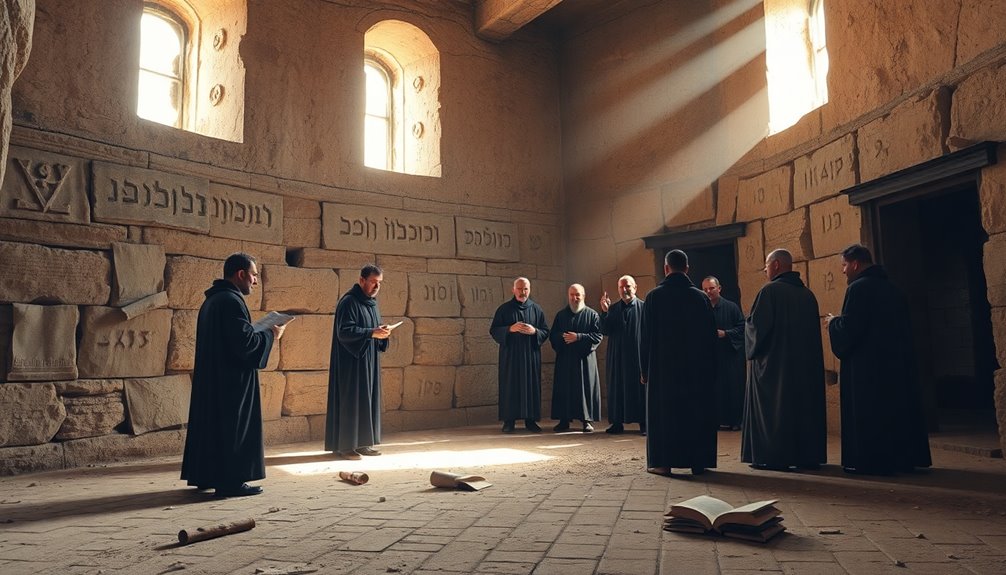
What do you know about the Pharisees? They were a significant Jewish religious sect that emerged around 165-160 BCE during the Second Temple period. Unlike the Sadducees, the Pharisees emphasized both the Written Law, or Torah, and the Oral tradition, which included interpretations and teachings passed down through generations.
This dual focus allowed them to advocate for a more democratic approach to religious practice, making Judaism accessible to everyday people. The term "Pharisee" translates to "separated one" in Hebrew, reflecting their dedication to studying and teaching the law while maintaining ritual purity.
They played a crucial role in shaping the synagogue as a central institution for worship and education, especially after the destruction of the Second Temple in 70 CE. Their teachings laid the groundwork for what would become Rabbinic Judaism, influencing modern Jewish thought and practices.
Pharisaic beliefs included concepts like resurrection and an afterlife, which set them apart from other sects of their time. Understanding the Pharisees helps you grasp the development of Jewish religious life and the evolution of its traditions that continue to resonate today.
Biblical Verses on Pharisees

When you look at the New Testament, you'll find the Pharisees mentioned frequently, especially in the Gospels.
Key verses reveal their complex relationship with Jesus, highlighting their focus on laws over compassion and righteousness.
Let's explore both primary and secondary references to understand their role better.
Primary Bible References
The Pharisees appear prominently in the New Testament, with 98 mentions primarily found in the Gospels, showcasing their influence during Jesus' ministry. They often serve as opponents of Jesus, challenging his teachings and practices. For instance, in Matthew 23, Jesus criticizes the Pharisees for their hypocrisy, highlighting their strict interpretation of the Torah while neglecting justice and mercy.
Notable interactions between Jesus and the Pharisees occur in Luke 7:36-50 and Luke 14:1, where they invite him to meals, illustrating their curiosity about his teachings. These moments reveal a complex relationship, as the Pharisees are torn between their adherence to the law and the new ideas Jesus presents.
The Apostle Paul, in Philippians 3:5, identifies himself as a Pharisee, emphasizing his strict adherence to the law before his conversion. This background provides insight into the rigorous interpretation of the Torah that the Pharisees upheld.
Moreover, Acts 23:8 describes them as acknowledging the resurrection of the dead and the existence of angels and spirits, showcasing their distinct theological beliefs compared to other Jewish sects.
Secondary Bible References
How do the secondary biblical references further illuminate the role of the Pharisees in the New Testament? The Pharisees appear prominently, mentioned 98 times, primarily in the Gospels, where they often stand in opposition to Jesus. Their complex relationship with Him is highlighted in Luke 13:31, where some Pharisees even warn Jesus about Herod's threat, showing they weren't always adversarial.
In Luke 18:9-14, the parable of the Pharisee and the tax collector starkly contrasts self-righteousness with humility, emphasizing divine mercy. This portrayal invites reflection on the nature of faith and repentance.
Acts 23:8 further distinguishes the Pharisees from the Sadducees, noting their belief in the resurrection of the dead and the existence of angels and spirits, illustrating key doctrinal differences.
Additionally, in Philippians 3:5, Paul identifies himself as a Pharisee, underscoring his strict adherence to the written Torah before embracing Christianity.
These secondary references not only contextualize the Pharisees within the broader narrative but also highlight their significant theological positions, shaping our understanding of their role in early Christian discourse.
Pharisees' Role in Synagogue Development
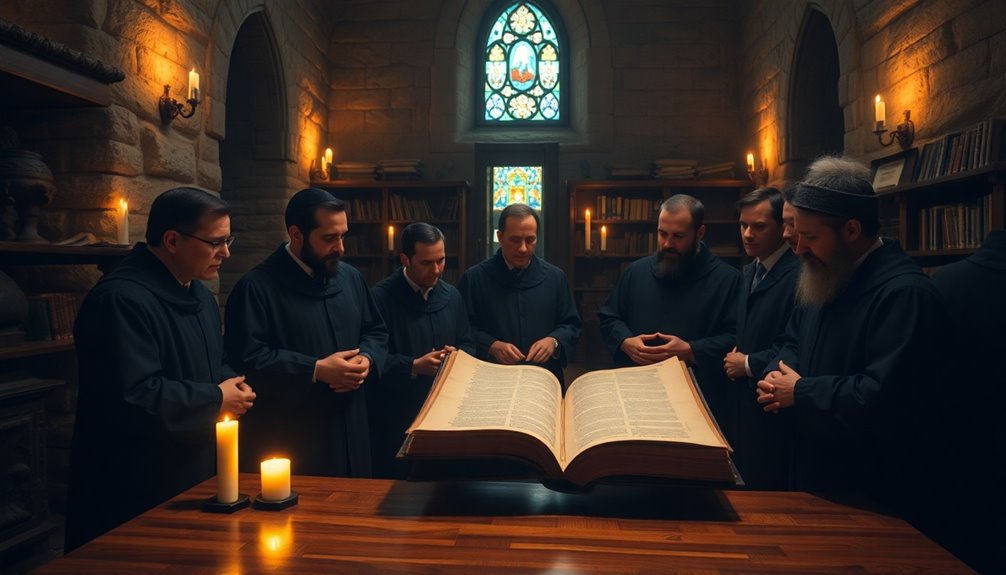
Central to the evolution of Jewish worship, the Pharisees significantly influenced the development of synagogues as vital community institutions. After the destruction of the Second Temple in 70 CE, the Pharisees shifted the focus from Temple sacrifices to communal prayer and Torah study. They advocated for a democratization of worship, emphasizing that synagogues should prioritize prayer and study over reliance on Temple priests.
By promoting the Oral Law, the Pharisees allowed for flexibility in synagogue practices, addressing contemporary issues and adapting rituals to meet the needs of the community. This emphasis on the Oral Law became integral to daily life in the synagogue, shaping the way Jewish teachings were understood and practiced.
The establishment of synagogues provided a crucial space for the Pharisees to teach and interpret the Torah, fostering a robust educational system that would later influence Rabbinic Judaism. Their efforts culminated in the compilation of the Mishnah around 200 CE, ensuring that their interpretations and practices were preserved.
Through these developments, the Pharisees played a pivotal role in shaping Jewish life, making synagogues central to communal worship and education.
Historical Context of Pharisees

Emerging during the tumultuous Second Temple period in Palestine around the 2nd century BCE, the Pharisees played a crucial role in shaping Jewish identity and practice. Following the Maccabean revolt, they became a prominent faction within Judaism, with an estimated population of around 6,000 just before the destruction of the Second Temple in 70 CE, as noted by the historian Josephus.
Unlike the Sadducees, who dismissed the Oral Law, the Pharisees emphasized the significance of both the Written Law (Torah) and the Oral Law, setting them apart in Jewish religious thought.
After the Temple's destruction, the Pharisaic traditions laid the groundwork for Rabbinic Judaism, shifting the focus of worship from the Temple to synagogues. This transformation was pivotal in ensuring the continuity of Jewish religious practices.
Their influence didn't stop there; it extended into the compilation of the Mishnah around 200 CE, which codified their interpretations of Jewish law. Through these developments, the Pharisees significantly contributed to the enduring legacy of Jewish religious life, adapting to changing circumstances while maintaining a commitment to their faith and traditions.
Pharisees and Social Status

When you think about the Pharisees, it's easy to assume they were just strict legalists.
However, their focus on personal piety and accessibility challenged that stereotype and showed a different side to their intentions.
Let's unpack how their social status and approach to Jewish law shaped their relationship with the wider community.
Debunk Pharisaic Legalism Misconceptions
Many misconceptions surround the Pharisees, especially regarding their perceived legalism and social status. Contrary to popular belief, the Pharisees didn't solely focus on rigid legalism; they emphasized the spirit of the Law and personal piety. They advocated for ethical behavior alongside adherence to the traditions of the Jewish faith.
You might be surprised to learn that Pharisaic teachings included the belief that human reasoning was vital for interpreting the Law, promoting adaptability in religious practice.
The Pharisees represented a predominantly middle-class demographic, including businessmen and synagogue leaders. This fact counters the notion that they formed an elite group. Instead, their commitment to democratizing Jewish worship and reducing the Temple priests' control showcased their focus on community involvement and accessibility in religious life.
They aimed to engage everyone, not just a select few. Moreover, Pharisaic traditions encouraged education and legal discourse, fostering a culture of scholarship that addressed contemporary issues.
Misinterpretation of Pharisaic Intent
The perception of the Pharisees as an elitist group often clouds their true intent and social standing. Contrary to popular belief, the Pharisees focused on democratizing Jewish religious practices, ensuring that the Law was accessible to all Jewish people, not just the priestly class. Their emphasis on oral tradition allowed them to adapt religious observance to the everyday lives of ordinary folks, moving away from exclusive Temple worship.
Many Pharisees were middle-class individuals—businessmen and synagogue leaders—who represented the majority of Jewish society. They weren't merely preserving social hierarchies; they aimed to address contemporary social issues by emphasizing the spirit of the Law rather than its literal interpretation. This concern for the welfare of the Jewish people often put them at odds with the Sadducees, who maintained strict adherence to Temple authority.
The conflicts between these groups highlighted the Pharisees' commitment to inclusivity in religious practice, seeking to extend observance beyond the Temple's confines. Rather than being self-righteous, the Pharisees championed a vision of faith that welcomed all, ensuring that every Jewish person could engage meaningfully with their spirituality.
Ethical Decision-Making Frameworks

When you think about the Pharisees, consider how their approach to ethics challenges you to reflect on the balance between legalism and genuine moral conduct.
Their emphasis on community engagement and individual responsibility invites you to explore how your decisions impact both your relationship with others and your spiritual life.
Let's unpack how these frameworks can guide your ethical decision-making today.
Self-Reflection on Legalism
Legalism often leads to a narrow view of ethics, where strict adherence to rules overshadows the underlying values they intend to promote. The Pharisees exemplified this through their commitment to over 600 laws, emphasizing ritual purity and detailed interpretations of the Torah. While their approach to ethical decision-making showcased a methodical application of rules, it often neglected core values like justice and mercy.
You might find it enlightening to reflect on how the Pharisees engaged in extensive debates about the application of these laws, particularly concerning the Sabbath. Their reliance on meticulous legal standards resulted in heavy burdens for the people, prioritizing rules over compassion.
This rigidity stands in stark contrast to the humility displayed by the tax collector in Jesus' parable, highlighting the ethical implications of legalism versus genuine repentance.
As you consider the impact of legalism in your own life, think about how a strict focus on rules may cloud your ability to see the bigger picture. True ethical decision-making involves balancing adherence to laws with an understanding of the values they're meant to embody, ensuring that your actions reflect both justice and mercy.
Community Engagement Strategies
Engaging with your community through effective ethical decision-making frameworks can create a more inclusive and compassionate environment. The Pharisees excelled in this area by advocating for interpretations of Jewish law that were accessible and relevant to daily life. Their focus on personal piety and ethical behavior allowed them to connect deeply with their communities.
Using synagogues as central hubs, the Pharisees transformed these spaces into places for worship, education, and community gatherings. This approach democratized religious practice, moving it beyond the Temple's authority. By emphasizing the spirit of the Law rather than strict adherence, they encouraged ethical decision-making that addressed contemporary societal issues.
The Pharisees' innovative use of hermeneutics enabled them to adapt legal interpretations to changing contexts, fostering an environment where community members could debate and apply ethical considerations.
Their teachings laid the groundwork for Rabbinic Judaism, which continued to evolve these community engagement strategies post-Temple, focusing on study and discussion of the Torah in everyday life.
Pharisees Shaped Jewish Identity
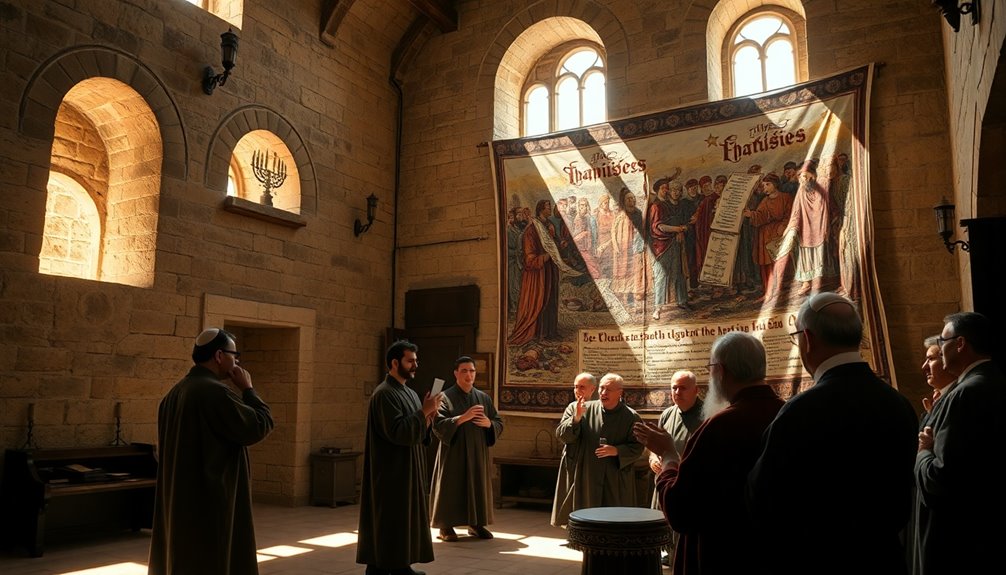
The Pharisees significantly shaped Jewish identity by emphasizing both the Written and Oral Law, which allowed for the adaptation of Jewish practices to the changing times. Their commitment to the Oral Law provided a framework for interpreting the Torah, enabling Jews to maintain their faith in diverse circumstances.
You'll notice that the Pharisees played a vital role in developing the synagogue as a central institution for worship. This democratization of religious life reduced the Temple priests' control over Jewish practices, allowing more individuals to engage in religious observance. By focusing on personal piety and following over 600 laws, they fostered a strong sense of communal identity among the Jewish populace.
After the destruction of the Second Temple in 70 CE, it was the Pharisees' interpretation of the Law and emphasis on education that helped preserve Judaism. Their teachings were later compiled in the Mishnah, which remains influential in shaping modern Jewish thought and identity.
In essence, the Pharisees not only adapted Jewish practices but also ensured that Jewish identity could thrive in a post-Temple world, laying the groundwork for what we now recognize as Rabbinic Judaism.
Additional Resources
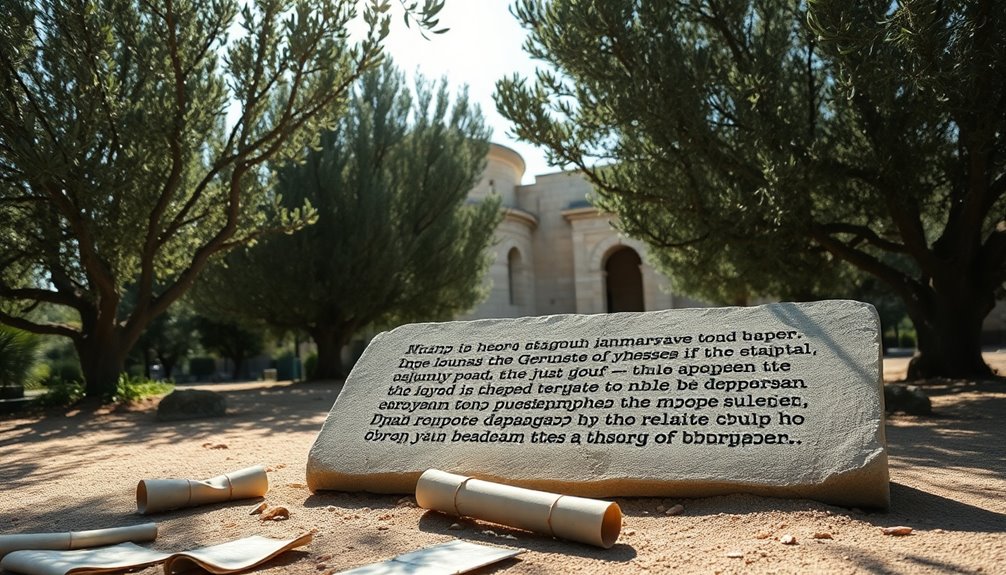
While exploring the role of the Pharisees in Jewish history, you might find it beneficial to delve into various resources that provide deeper insights into their beliefs and practices.
Start with texts that focus on the Second Temple period, as this was when the Pharisees emerged and shaped Jewish thought. Key readings include the Mishna, which compiles Pharisaic teachings and serves as a cornerstone for Rabbinic Judaism.
Additionally, consider scholarly articles and books that discuss the distinction between the Pharisees and the Sadducees, particularly regarding the Oral Law and interpretations of Jewish law. Notable figures like Nicodemus and Gamaliel appear in the New Testament, providing a fascinating window into how Pharisees interacted with early Christianity.
Online databases and libraries often have curated lists of resources on Jewish history, where you can find works by historians specializing in Pharisaic studies.
Documentaries or lectures on Rabbinic Judaism can also offer visual and auditory insights, enhancing your understanding of this critical sect.
Frequently Asked Questions
Who Are the Pharisees According to the Bible?
When you read the Bible, you'll find the Pharisees depicted as a Jewish sect known for their strict adherence to the Law.
They emphasize tradition and interpretation, believing in the resurrection and individual moral responsibility.
Often, you'll see them as opponents of Jesus, criticized for their legalism and self-righteousness.
Their influence shaped Rabbinic Judaism, especially after the Second Temple's destruction, and their teachings are foundational in Jewish tradition.
What Is the Difference Between the Sadducees and the Pharisees?
The main difference between the Sadducees and Pharisees lies in their beliefs and practices.
You'll find that the Sadducees adhere strictly to the Written Law, rejecting the Oral Law, while the Pharisees embrace both.
When it comes to resurrection and the afterlife, the Pharisees believe in them, but the Sadducees don't.
Additionally, the Pharisees focus on personal piety and ritual purity, contrasting with the Sadducees' emphasis on Temple practices and priestly authority.
What Did It Mean to Be a Pharisee?
Being a Pharisee means you're committed to a strict interpretation of both the Written and Oral Law.
You emphasize personal piety and moral conduct, often distancing yourself from those you see as impure.
You believe in critical doctrines like resurrection and individual afterlife rewards.
Your role in society involves promoting synagogues for worship and education, debating laws, and adhering to detailed scribal traditions, which shape the foundations of Jewish legal texts.
Who Are Considered Pharisees Today?
Today, people often use "Pharisee" to describe those who seem hypocritical or self-righteous in their beliefs. You might encounter this term in discussions about moral integrity or religious practices.
However, it's important to note that modern Judaism, especially Orthodox Judaism, traces its roots back to the Pharisees. Engaging with Pharisaic thought can enrich your understanding of Jewish law and ethics, highlighting its continued relevance in contemporary religious conversations.

